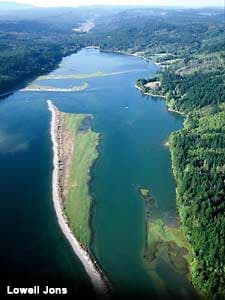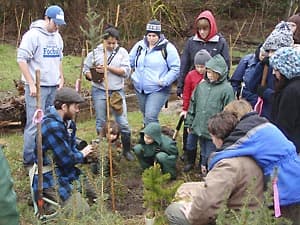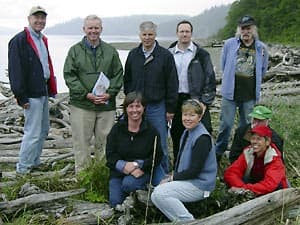Tarboo Watershed Program

Since 2002, NWI has been leading an innovative whole-watershed program to protect and restore the Tarboo watershed, from the headwaters of Tarboo Creek to Tarboo-Dabob Bay. With support from landowners and over 45 partnering organizations, NWI is working to restore abundant salmon runs of Tarboo Creek, protect the shellfish and wildlife resources of Dabob Bay, and grow a sustainable, natural resource-based economy.
Research and Assessment
The Tarboo Watershed provides an ideal location for salmon restoration efforts. It is large enough to support several wild salmon runs, yet small enough to conduct whole-watershed monitoring and assessment. NWI’s Tarboo Wildlife Preserve serves as a 316-acre field research station, and base of operations for short and long-term studies.
NWI is involved in many habitat and salmon related research and monitoring projects in the Tarboo watershed. A comprehensive watershed assessment was conducted in 2002-03, including water quality, habitat and juvenile coho surveys. NWI and the Port Townsend Marine Science Center collaborated on a nearshore fish survey in Tarboo-Dabob Bay and conduct intensive spawning surveys for coho salmon, chum salmon, and steelhead here for over ten years. Restoration projects are monitored on an individual basis. Currently, NWI is conducting experimental planting trials to determine the best methods for re-vegetating pasture lands and reed canary grass dominated areas. Learn about our research and assessment programs...

Habitat Protection and Restoration
Northwest Watershed Institute's objectives for the Tarboo Watershed are to work with willing landowners to protect and restore a stream and wetland corridor from the headwaters of Tarboo Creek to Dabob Bay, conserve lands within the Dabob Bay Natural Area, and keep large tracts of private forest land within the upper watershed in forestry to prevent cumulative impacts of development. Learn about our conservation strategy...
Significant achievements include:
- Protected over 2,200 acres within the boundaries of the Dabob Bay Natural Area, DNR's state managed natural preserve.
- Negotiated conservation easements with eight cooperating private landowners along Tarboo Creek to permanently protect over 500 acres of streams and wetlands.
- Removed 12 road culverts, restoring access to one-third of the potential fish bearing streams in the Tarboo Watershed.
- Restored over 3 miles of ditched and straightened streams in the watershed into sinuous channels with instream logs and gravels. The streams, now reconnected to surrounding wetlands and floodplains, also protect downstream water quality.
- Planted 90,000 native trees and shrubs along Tarboo creek. NWI's field crew and Plant-A-Thon volunteers planted the trees. NWI monitors and maintains the plantings until they are large enough to survive on their own.
- NWI completed a major step to protect forestlands in the watershed with the Tarboo Forest Project that permanently protected 257 acres of mature forest adjacent to the Tarboo Wildlife Preserve that would otherwise have been clearcut and sold for development.

Fisheries Management
NWI advocates for fishery management regulations that ensure that enough salmon come back to spawn in restored habitats of Tarboo Creek to rebuild abundant, sustainable populations and fisheries. Learn more about our advocacy for improving fisheries management...

Education and Outreach
NWI conducts educational programs at the Tarboo Wildlife Preserve and in the larger Tarboo Watershed. From the restored streams, forests and wetlands of the Tarboo valley to the diversity of marine habitats of Dabob Bay, the area offers a unique opportunity to learn about Puget Sound environments. Learn about our education and outreach programs...

Partners
NWI is currently working with over 45 project partners, including the U.S. Fish and Wildlife Service, Tribes, Ecology, NOAA Fisheries, The Nature Conservancy, and Washington Departments of Natural Resources and Ecology to implement conservation of Tarboo Creek and Tarboo-Dabob Bay.

Tarboo Wildlife Preserve
NWI’s long-term base of operation in the Tarboo watershed is the 316-acre Tarboo Wildlife Preserve, a regional environmental education and field research station dedicated to the protection and restoration of fish and wildlife.
